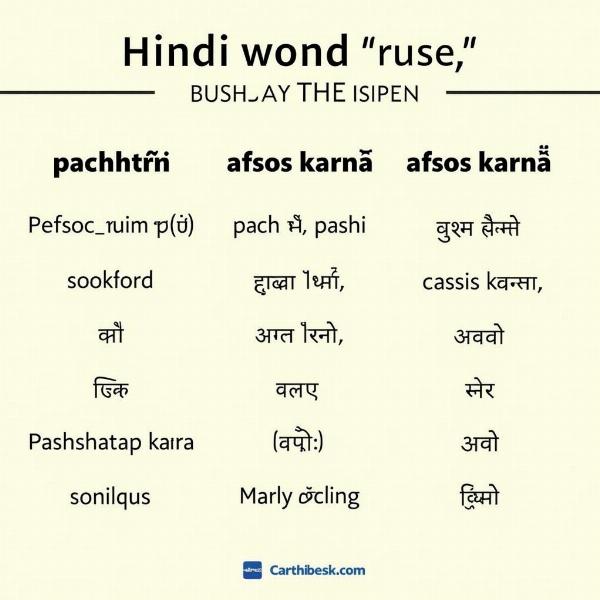Understanding the meaning of “rues” in Hindi can be tricky, especially given the nuances of both English and Hindi. This guide explores the various Hindi translations of “rues,” delving into their contextual usage and providing practical examples to ensure clarity. We’ll also discuss common synonyms and related terms to enrich your understanding of this multifaceted word.
Understanding the Verb “to Rue”
The English verb “to rue” signifies feeling regret or remorse for something done or undone. It often implies a deep sense of sorrow or repentance for past actions. Finding the perfect Hindi equivalent requires considering the specific shade of meaning intended.
Common Hindi Translations of “Rues”
Several Hindi words can convey the meaning of “rues,” each with its own subtle nuances:
पछताना (pachhtānā)
This is perhaps the most common and direct translation of “rues.” It signifies feeling regret or repentance.
- Example: वह अपने किए पर पछता रहा है (vah apne kie par pachhtā rahā hai) – He rues his actions.
अफ़सोस करना (afsos karnā)
This translates to “to regret” or “to feel sorry.” It’s slightly less intense than “pachhtānā” and often used for less serious regrets.
- Example: मुझे अफ़सोस है कि मैं पार्टी में नहीं आ सका (mujhe afsos hai ki main party mein nahin aa sakā) – I rue that I couldn’t come to the party.
पश्चाताप करना (pashchatap karnā)
This word carries a stronger connotation of remorse and penitence than “pachhtānā.” It implies a deep sense of guilt and a desire to atone for one’s actions.
- Example: उसने अपने अपराध के लिए पश्चाताप किया (usne apne aparādh ke liye pashchatap kiyā) – He rued his crime.
 Hindi Translations of Rues
Hindi Translations of Rues
Choosing the Right Hindi Word
Selecting the most appropriate Hindi translation depends heavily on the context. Consider the intensity of the regret being expressed. For everyday regrets, “afsos karnā” might suffice. For deeper remorse or repentance, “pachhtānā” or “pashchatap karnā” would be more suitable.
What does someone who rues something feel?
Someone who rues something experiences a range of negative emotions, from mild disappointment to profound sorrow and guilt. These feelings often stem from recognizing the negative consequences of their actions or inactions.
Conclusion
Understanding the nuances of “rues” and its various Hindi translations is crucial for effective communication. By carefully considering the context and choosing the most appropriate word, you can accurately convey the intended meaning of regret, remorse, or repentance. Remember to consider the intensity of the emotion being expressed when choosing between “pachhtānā,” “afsos karnā,” and “pashchatap karnā.”
FAQs
- What is the closest Hindi word to “rues”? पछताना (pachhtānā) is generally the closest equivalent.
- Can I use “afsos karnā” for serious regrets? While possible, it’s generally better to use “pachhtānā” or “pashchatap karnā” for expressing deeper remorse.
- Is “ruing” the same as “regretting”? While similar, “ruing” often implies a stronger and more lasting feeling of regret.
- How do I choose between “pachhtānā” and “pashchatap karnā”? “Pashchatap karnā” suggests a deeper sense of remorse and a desire for atonement.
- Are there other ways to express regret in Hindi? Yes, several other words and phrases can express regret, depending on the specific nuance you want to convey.
Meaning-Hindi.in is your trusted partner for all your Hindi translation needs. We offer a wide range of professional translation services, including business and commercial document translation, certified and legal document translation, technical and user manual translation, website and localization translation, educational and academic document translation, express translation, and specialized translation. Contact us today at [email protected] or +91 11-4502-7584 to learn more about how Meaning-Hindi.in can help you bridge the language gap.